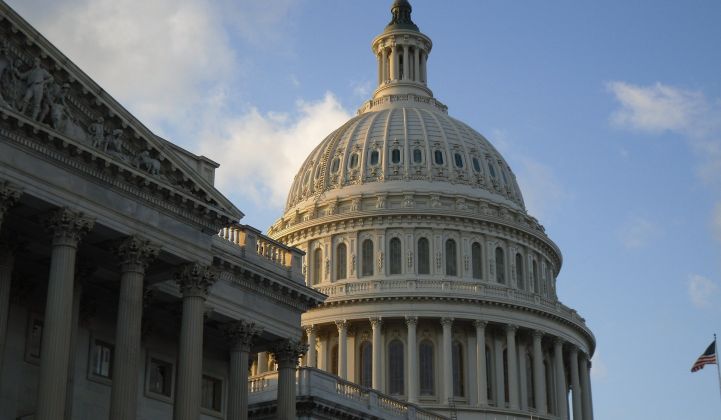The U.S. Senate reached an agreement on a $2 trillion coronavirus stimulus bill early Wednesday morning, but the package does not include the tax credit extensions and direct pay provisions sought by the wind and solar industries to help them weather the supply-chain and economic disruptions caused by the global pandemic.
Clean-energy industry groups confirmed Wednesday that the stimulus bill, the largest of its kind in U.S. history, lacks extensions of the federal wind Production Tax Credit (PTC) and solar Investment Tax Credit (ITC), which would have prevented them from losing access to full credits and threatening their financial viability. The Senate passed the bill late Wednesday night.
The package also lacks proposals to replace the credits with direct payments to companies and investors, meant to serve as an alternative means of receiving funding if an economic downturn results in less tax equity available for wind and solar projects.
The American Wind Energy Association had warned that failure to pass the provisions could threaten up to $43 billion in investments. Wind projects must be completed by the end of 2020 to be eligible for the full PTC, and Wood Mackenzie has said that many U.S. wind projects are at risk of missing the deadline.
"While we’re disappointed clean energy sector relief did not make it into the phase three stimulus package, we will continue working with Congress and other renewable energy leaders to find solutions to the specific challenges COVID-19 is causing our members," AWEA CEO Tom Kiernan said in a statement.
Solar companies are also under pressure to cement delivery and possession of key equipment by no later than mid-April, to assure they comply with the 5 percent safe-harbor provisions of the ITC that allows them to receive the full 30 percent credit. The Solar Energy Industries Association has warned that tens of thousands of solar jobs may be at risk from the coronavirus pandemic's economic effects.
Given the political challenges the renewables industry faced in securing such support measures in the stimulus bill, trade groups have been seeking alternatives to ease these deadlines, including asking the U.S. Treasury Department for an administrative extension of the deadlines or changes in language to reassure investors that the unforeseeable disruptions of the COVID-19 pandemic will not threaten their ability to meet them.
It’s less clear how the industries will manage the loss of appetite for tax credits, absent legislation. A global economic downturn is likely to reduce profits for many companies, which could significantly reduce their tax liabilities and shrink the pool of potential investors.
With the stimulus bill expected to pass the House of Representatives and be signed by President Trump in the coming days, clean-energy advocates are now turning their attention to the possibility of future legislation aimed at relieving specific industries, said Gregory Wetstone, CEO of the American Council on Renewable Energy.
“When lawmakers turn their attention to measures aimed at bolstering specific sectors of the economy adversely impacted by the coronavirus, we want to make sure they understand how supply-chain disruptions and other pandemic-related delays are threatening the jobs of hundreds of thousands of workers in the renewable sector and the time-sensitive tax incentives on which renewable project financing depends," Wetstone said in a statement.




